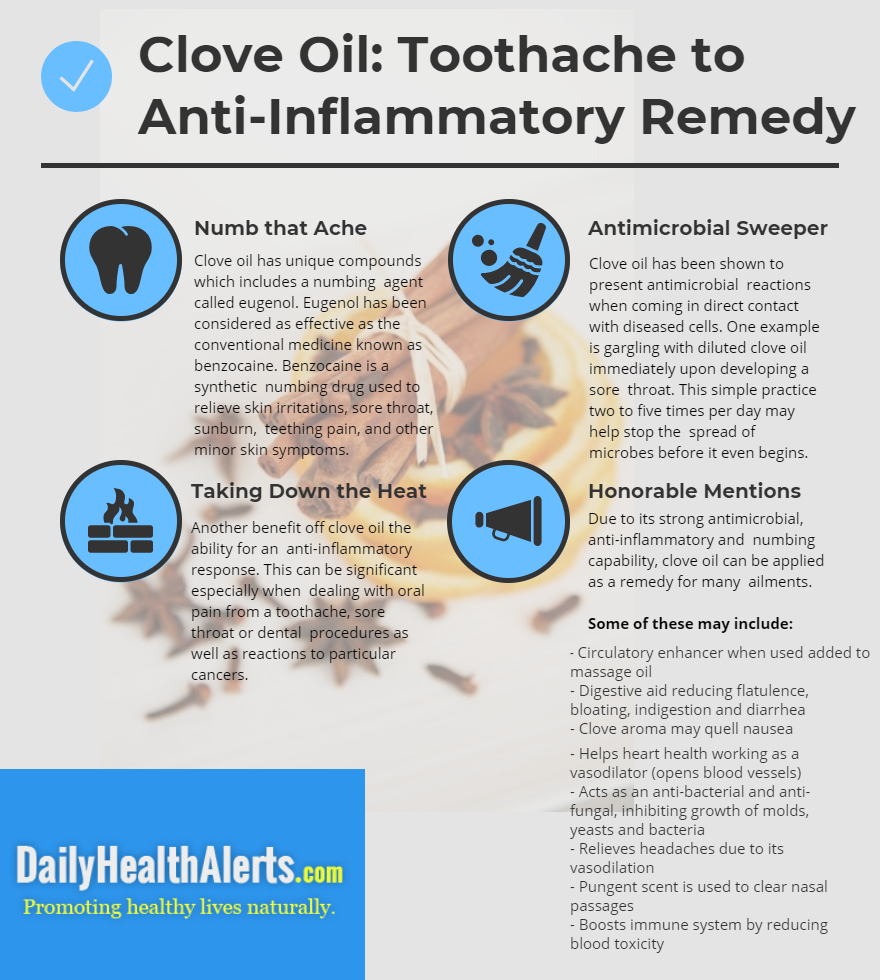Inexpensive and effective, a small bottle of clove oil in your bathroom cabinet could make all the difference for unexpected pain. This pungent, spicy herb is steeped in history as one of the top remedies used by a multitude of tribes, cultures and religions. Tuck it in there behind your toothpaste and it will be waiting like a loyal soldier to help you out when you need it most.

Numb that Ache
Clove oil has unique compounds which includes a numbing agent called eugenol. Eugenol has been considered as effective as the conventional medicine known as benzocaine. Benzocaine is a synthetic numbing drug used to relieve skin irritations, sore throat, sunburn, teething pain, and a variety of other minor skin symptoms. However, clove oil might be a more natural option.
A study published in the Journal of Dentistry titled, ‘The effect of clove and benzocaine versus placebo as topical anesthetics’ concluded,
“Clove gel might possess a potential to replace benzocaine as a topical agent before needle insertion.”
From needle insertion to numbing tooth pain, chalk one up for clove oil getting the job done to stop pain in its tracks.
Antimicrobial Sweeper
Clove oil has been shown to present antimicrobial reactions when coming in direct contact with diseased cells. One example is gargling with diluted clove oil immediately upon developing a sore throat. This simple practice two to five times per day may help stop the spread of microbes before it even begins.
Studied by many laboratories it was one that revisited clove oil even after it was proven to successfully stop the spread of Pseudomonas aeruginosa PAO1 (the most commonly used strain for research). In a 2018 study, as published by Nature’s Scientific Reports, it was written in the abstract that the same researchers wanted to “probe more deeply into the effect of CBO [clove bud oil] on four pseudomonal proteases – elastase A, elastase B, protease IV and alkaline protease – each known to play key roles in disease pathogenesis.”
The conclusion of this second study confirmed that clove oil was indeed a possible option for battling systemic microbial compromises. The researchers stated,
“Our observations further established that CBO treatment results in inhibition of both elastase A and B of P. aeruginosa, two metalloproteases that also play an important role in pathogenesis [development of disease]”.
Taking Down the Heat
Another benefit off clove oil the ability for an anti-inflammatory response. This can be significant especially when dealing with oral pain from a toothache, sore throat or dental procedures as well as reactions to particular cancers. The clove oil numbing effect begins dulling the pain while other properties also soothe angry nerve responses. Before you know it, the pain is gone and you can make it through the night to get looked at in the morning.
The journal Pharmaceutical Biology (12/17) published a study by American researchers titled, ‘Anti-inflammatory activity of clove (Eugenia caryophyllata) essential oil in human dermal fibroblasts’.
The study found that clove oil:
The study concluded that,
“This study provides important evidence of CEO [clove essential oil] – induced anti-inflammatory and tissue remodeling activity in human dermal fibroblasts. This study also supports the anticancer properties of CEO and its major active component eugenol.”
Honorable Mentions
Due to its strong antimicrobial, anti-inflammatory and numbing capability, clove oil can be applied as a remedy for many ailments. Some of these may include:
Adding natural remedies to your medicine cabinet is essential. These should be the first responders you go to before reaching for a conventional drug. You’ll be surprised how alternative choices like clove oil work rapidly and efficiently without synthetic medication side effects. Do not use clove oil if you are taking blood thinning medication, do not use internally for more than two weeks straight, and do not give to children or take if pregnant.